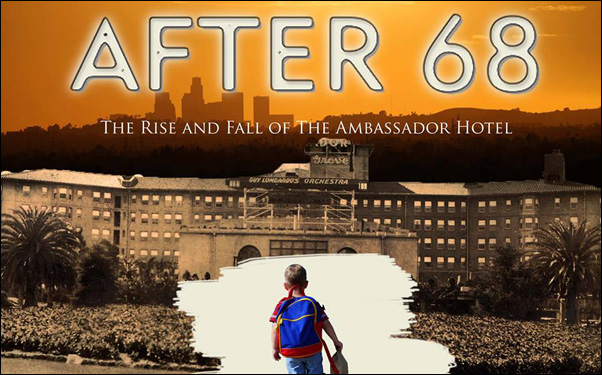When Camilo Silva moved to Los Angeles from the Bay Area, he didn’t need to look far to get a feel for the city, having taken up residence in an apartment right behind one of the L.A.’s most famous landmarks, the Ambassador Hotel, though he wouldn’t have much time to appreciate it.
“As I would walk my dogs by the shuttered building, it began to pique my curiosity,” says Silva, who moved in shortly before the building was demolished in 2005. “I started researching the site. And uncovered a plethora of rich history that left me scratching my head wondering, “How could a place with such an amazing history be closed?”
Despite great protests, locals couldn’t stave off the end of the Ambassador. But it was just the beginning for the recent USC grad, who had no plans to pursue filmmaking himself, yet decided to pick up a camera to capture the Ambassador’s final days and has worked backwards to preserve its incredible history in “After 68,” a documentary currently raising funds on IndieGoGo before an August 24th deadline.
“The Ambassador needs it’s rightful place in history and I wasn’t going to let it be demolished and it’s memories disappear with it,” says Silva, who has spent his nights and weekends away from his day job in marketing for the past eight years making sure that wouldn’t happen. One only needs to watch the trailer for “After 68” to understand what’s at stake since it features the late Merv Griffin, who passed away in 2007, one of the many guests of the hotel who Silva has been able to talk to.
The film, whose title refers to the Ambassador’s turning point from one of Tinseltown’s most top-flight locales to one of its most infamous after Robert F. Kennedy’s assassination there in 1968, chronicles both its glory days as recounted by the likes of Carol Channing to the fevered battle to keep it open during the 2000s between the Los Angeles Conservancy and the L.A. Unified School District, which wanted the land for a new school. However, after recruiting friends who were filmmakers to lend their time as well to this labor of love, Silva now needs support from the crowd since the time has come to complete production and put all this incredible footage together, more of which comes in by the day.
“Although I’ve been working on this film for many years and have researched the Ambassador for days on end throughout the process, I continue to discover new things about this site which makes this project so exciting to work on,” says Silva. “Every corner I turn, I find a new treasure.”
Silva isn’t only encouraged by all the stories he hears or new photographs he uncovers on a daily basis, but since making the project known on IndieGoGo, he’s been heartened by the feedback, a reminder of what made the hotel so special that will work it’s same magic on the film – the community. He’s also realized the film is about something far different than what he originally envisioned.
“When we first began filming we were just trying to capture the history of the hotel and shoot the building before it was knocked down,” says Silva, who expects the film could be completed by January if he gets enough backing through crowdsourcing. “Over time, however, the project began to evolve as we interviewed people and saw the building of the new schools. The heart of the film began to emerge and themes of historic preservation soon started to shape the narrative and paint a bigger picture of what the Ambassador truly represented. The Ambassador is just one of countless treasured sites that have been destroyed and we realized that sharing its story could also be an opportunity to inspire other communities to think twice before destroying a piece of their cultural memory and civic identity.”
To back this project and to watch the trailer, check out the IndieGoGo page here. And follow the film’s progress on Facebook and Twitter.




